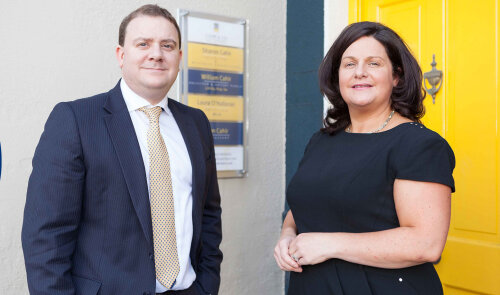Best Truck Accident Lawyers in Ennis
Share your needs with us, get contacted by law firms.
Free. Takes 2 min.
List of the best lawyers in Ennis, Ireland
About Truck Accident Law in Ennis, Ireland
Truck accidents in Ennis, Ireland involve collisions where heavy goods vehicles, articulated trucks, delivery lorries or other commercial vehicles cause injury, damage or loss. Cases can be complex because they often involve multiple parties - the truck driver, the trucking company or operator, the vehicle owner, vehicle maintenance contractors, cargo shippers, or third parties whose negligence contributed to the crash. Irish personal injury law provides a route to compensation for people injured in road traffic collisions, but the process is shaped by local procedures, statutory time limits and evidence requirements. Understanding the basics - how negligence is proved, which local bodies investigate road collisions, and how compensation is assessed - helps injured people make informed choices about seeking legal advice and taking action.
Why You May Need a Lawyer
- Serious or lasting injuries - where medical treatment, ongoing care, rehabilitation or loss of earnings are involved, a solicitor can quantify short-term and long-term losses and help obtain appropriate medical evidence.
- Complex liability - when fault is disputed, multiple parties are potentially liable, or employers and insurers blame each other, a lawyer can investigate, collect evidence and coordinate claims against the correct defendant.
- Evidence gathering - solicitors know which records to seek - tachograph data, driver's hours logs, maintenance and service history, load and delivery records, CCTV or dashcam footage, and Garda collision reports - and can preserve them before they are lost.
- Insurer negotiations - insurance companies will attempt to limit liability. A solicitor experienced in motor and truck cases can handle negotiations, advise on offers, and avoid early low settlements that do not cover future needs.
- PIAB and court procedure - in most personal injury claims in Ireland you must first apply to the Personal Injuries Assessment Board (PIAB). A solicitor will guide you through PIAB procedures and, if necessary, subsequent court proceedings.
- Calculating damages - truck crash claims often include physical and psychological injury, past and future loss of earnings, care costs and modification needs. A lawyer ensures a full and realistic claim is prepared.
Local Laws Overview
- Time limits - Personal injury claims in Ireland are generally subject to a two-year limitation period from the date of the accident or from the date the injured person knew, or ought to have known, they had a cause of action. Special rules apply to minors and some exceptional cases, so prompt action is important.
- PIAB requirement - before issuing court proceedings for most motor personal injury claims, claimants must normally make an application to the Personal Injuries Assessment Board. PIAB will investigate and may make an assessment of compensation; if PIAB is declined or an assessment is not accepted either side can proceed to court.
- Duty of care and negligence - the legal test requires proving that the defendant owed the claimant a duty of care, breached that duty, and caused the claimant to suffer damage. With trucks this often involves proving driver error, vehicle defects, poor maintenance, improper loading, or employer negligence in training or rostering.
- Employer and vicarious liability - employers can be liable for negligent acts of employees carried out in the course of employment. This can extend to haulage companies and subcontractors, depending on control and contractual arrangements.
- Commercial vehicle regulations - driver hours, rest breaks, tachograph requirements and vehicle safety standards are governed by Irish and EU rules. Breaches of rules on drivers' hours or tachograph tampering are important indicators of negligence or liability in serious crashes.
- Contributory negligence - if the injured person was partly at fault, Irish law allows for a reduction in damages proportionate to the claimant's share of responsibility.
- Uninsured or unidentified drivers - special schemes and bodies, such as the Motor Insurers' Bureau of Ireland or specific compensation routes, may be relevant if the responsible driver is uninsured or cannot be identified.
Frequently Asked Questions
What should I do immediately after a truck accident in Ennis?
Ensure everyone is safe and seek medical attention even for minor injuries. Contact the Garda - obtain the incident or collision number. Exchange details with the truck driver - name, address, vehicle registration and insurer - and note the trucking company name if visible. Take photographs of vehicle positions, damage, road layout, weather conditions and any road signage. Gather contact details of witnesses. Do not admit fault at the scene. Preserve any physical evidence and keep records of medical treatment and expenses.
How long do I have to bring a claim after a truck accident?
Generally you have two years from the date of the accident or from the date you knew you had a cause of action to start a claim. There are different rules for minors and some special circumstances, and exceptional exceptions may apply. Because evidence can be lost and deadlines can expire, it is important to contact a solicitor promptly.
Do I have to apply to PIAB before going to court?
In most personal injury cases in Ireland you must make an application to the Personal Injuries Assessment Board first. PIAB will investigate the claim and may make an assessment. If PIAB is not used or an assessment is rejected, either party may proceed to issue court proceedings. A solicitor will advise on whether your case is suitable for PIAB or whether exemptions may apply.
Who can be held liable for a truck crash?
Liability may rest with the truck driver, the trucking company or operator, the vehicle owner, a maintenance contractor, the cargo loader, a manufacturer or a third party whose negligence contributed. Employers can be vicariously liable for employees driving in the course of employment. Identifying the right defendant is a key early step in building a claim.
What types of compensation can I recover?
Compensation can include general damages for pain and suffering, special damages for past and future loss of earnings, medical and rehabilitation costs, prescription and care costs, travel expenses for treatment, and costs for adapting a home or vehicle where needed. Severe cases may include awards for loss of amenity and long-term care needs.
Can I claim if I was partly to blame?
Yes. The Irish courts apply the principle of contributory negligence. If your actions contributed to the accident, any award of damages can be reduced to reflect your share of responsibility. A solicitor will argue the appropriate apportionment and gather evidence to minimise any reduction.
What evidence is most useful in truck accident claims?
Key evidence includes photographs of the scene, vehicle damage and injuries; witness statements; Garda collision reports; CCTV or dashcam footage; truck tachograph and drivers' hours records; vehicle maintenance and service logs; load manifests; training and employment records; and medical reports charting diagnosis, treatment and prognosis. Early preservation of records is crucial.
How long will a truck accident claim take and how much will it cost?
Timelines vary - a straightforward claim resolved via PIAB might conclude in months, while disputed cases that go to court can take 1-3 years or longer depending on medical complexity and court backlogs. Costs depend on complexity, expert evidence required and whether the case settles or goes to trial. Many solicitors offer an initial consultation and may use conditional fee agreements or other funding arrangements. Discuss costs and fee structures at the first meeting and get terms in writing.
What if the truck driver is uninsured or the truck cannot be identified?
If the at-fault vehicle is uninsured or unidentified, special procedures may apply. Bodies such as the Motor Insurers' Bureau of Ireland or government schemes can sometimes assist with compensation. A solicitor will advise on the available routes, evidence needed and likely outcomes.
Should I speak to the truck company's insurer directly?
You should be cautious about giving statements or signing forms for an insurer without legal advice. Early offers from insurers may be low and may not account for future needs. Inform your own insurer if required, but consider instructing a solicitor to handle communications and negotiate on your behalf to protect your interests.
Additional Resources
- Road Safety Authority - provides guidance on road safety and vehicle standards and collects collision statistics that may be relevant to understanding local risks.
- An Garda Siochana - local Garda stations investigate collisions and issue collision numbers and reports used in claims.
- Personal Injuries Assessment Board (PIAB) - the statutory body that handles preliminary assessment of personal injury claims in Ireland.
- Law Society of Ireland - the professional body for solicitors - useful to check solicitor credentials and guidance on legal practice standards.
- Citizens Information - offers practical information on legal rights, compensation processes and public services.
- Legal Aid Board - may provide civil legal aid or advice for eligible applicants in some cases.
- Motor Insurers' Bureau of Ireland - resource for issues involving uninsured or unidentified drivers.
- Health Service Executive and local medical services - for treatment and medical records that support injury claims.
- Clare County Council - local authority that manages road maintenance and signage records which can be relevant where road defects or signage contributed to a crash.
Next Steps
- Prioritise safety and medical care - get urgent medical attention and keep detailed records of all treatment, appointments and expenses.
- Preserve evidence - photograph the scene, record vehicle registration numbers, keep clothing and damaged items, and collect witness details. Ask Garda for the collision number and request a copy of the report.
- Notify insurers - inform your insurer promptly as required by your policy, but avoid detailed discussions with the other side's insurer without legal advice.
- Contact a solicitor experienced in truck and commercial vehicle collisions - arrange an early consultation to review evidence, discuss PIAB procedures and assess potential defendants. Ask about fees, funding options and the solicitor's experience with heavy vehicle claims.
- Make a PIAB application if appropriate - your solicitor can advise and prepare the application or confirm if an exemption applies.
- Keep records - maintain a file of all correspondence, medical reports, receipts for expenses and any communications related to the accident. This helps your solicitor prepare a comprehensive claim.
- Act quickly - because of legal time limits and the risk of lost evidence, consult a solicitor as soon as practicable to protect your rights and get informed practical advice tailored to your situation.
Lawzana helps you find the best lawyers and law firms in Ennis through a curated and pre-screened list of qualified legal professionals. Our platform offers rankings and detailed profiles of attorneys and law firms, allowing you to compare based on practice areas, including Truck Accident, experience, and client feedback.
Each profile includes a description of the firm's areas of practice, client reviews, team members and partners, year of establishment, spoken languages, office locations, contact information, social media presence, and any published articles or resources. Most firms on our platform speak English and are experienced in both local and international legal matters.
Get a quote from top-rated law firms in Ennis, Ireland — quickly, securely, and without unnecessary hassle.
Disclaimer:
The information provided on this page is for general informational purposes only and does not constitute legal advice. While we strive to ensure the accuracy and relevance of the content, legal information may change over time, and interpretations of the law can vary. You should always consult with a qualified legal professional for advice specific to your situation.
We disclaim all liability for actions taken or not taken based on the content of this page. If you believe any information is incorrect or outdated, please contact us, and we will review and update it where appropriate.










